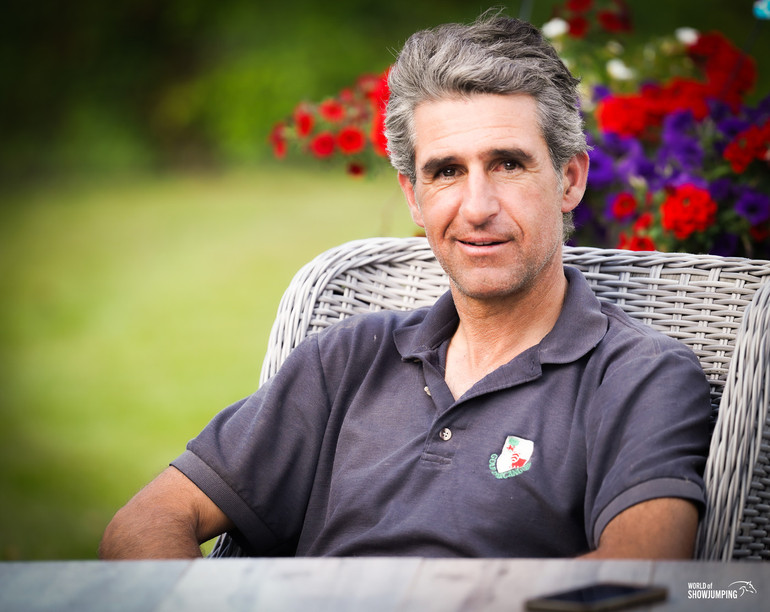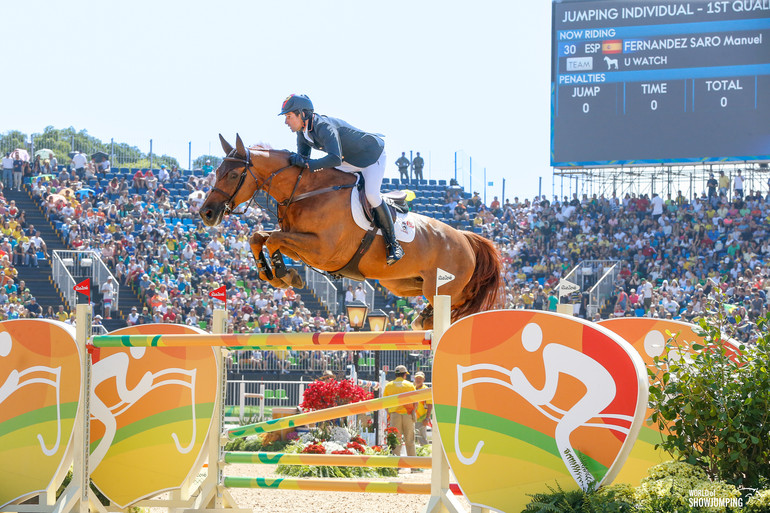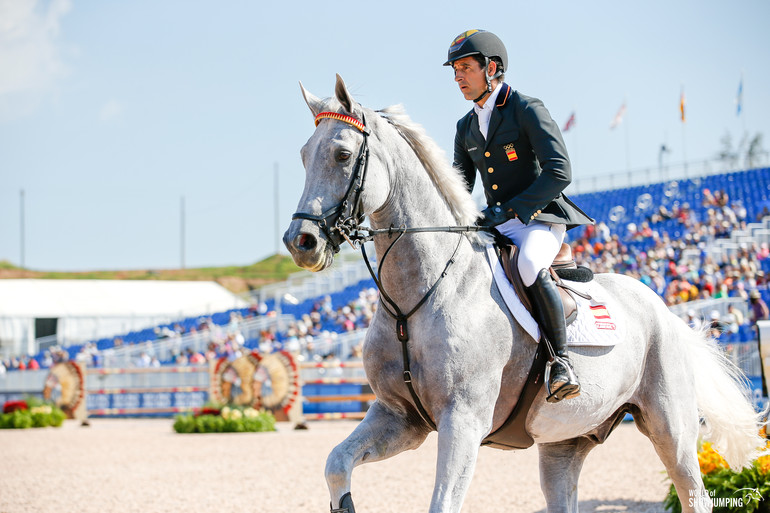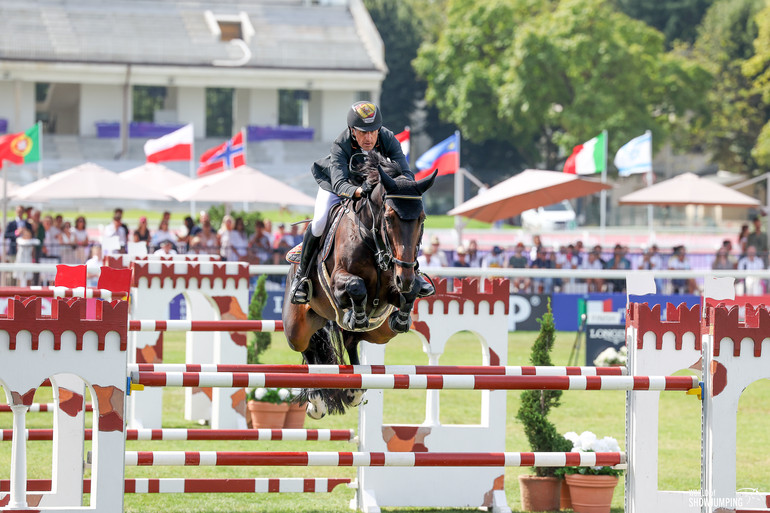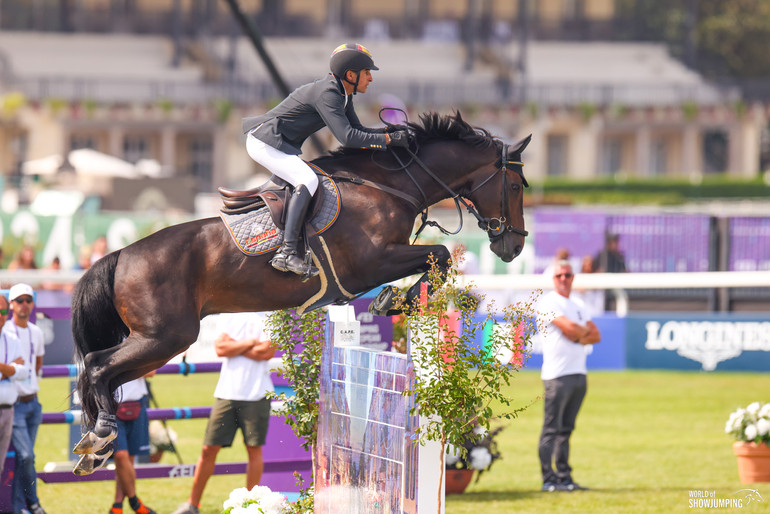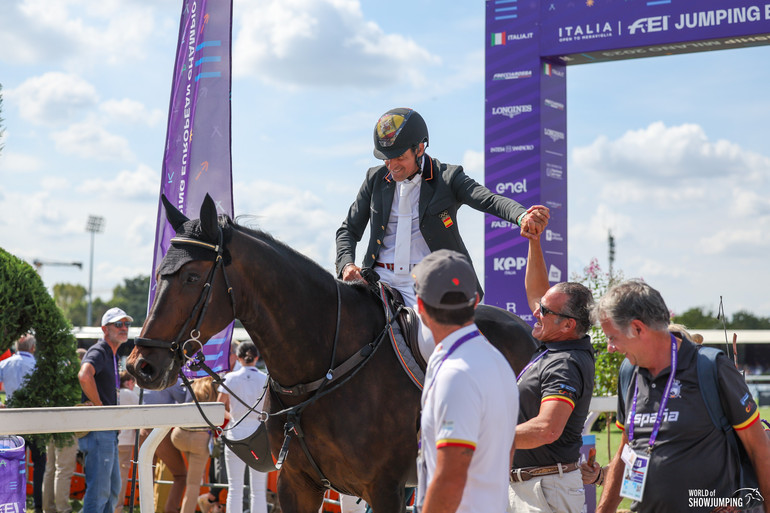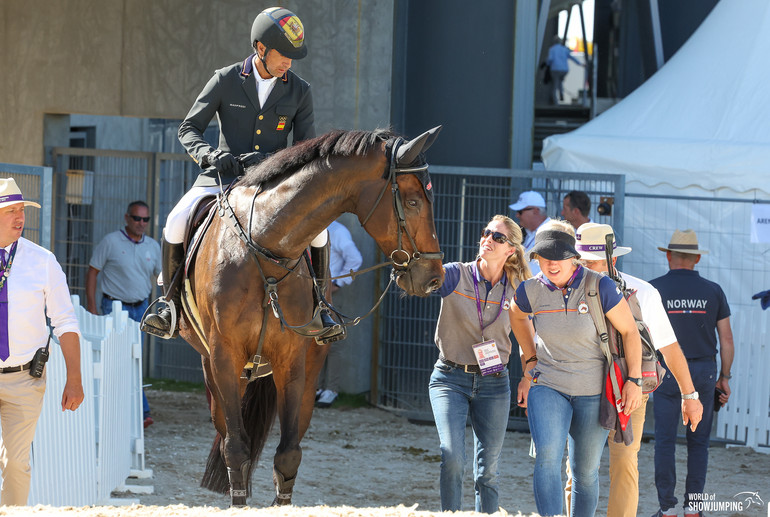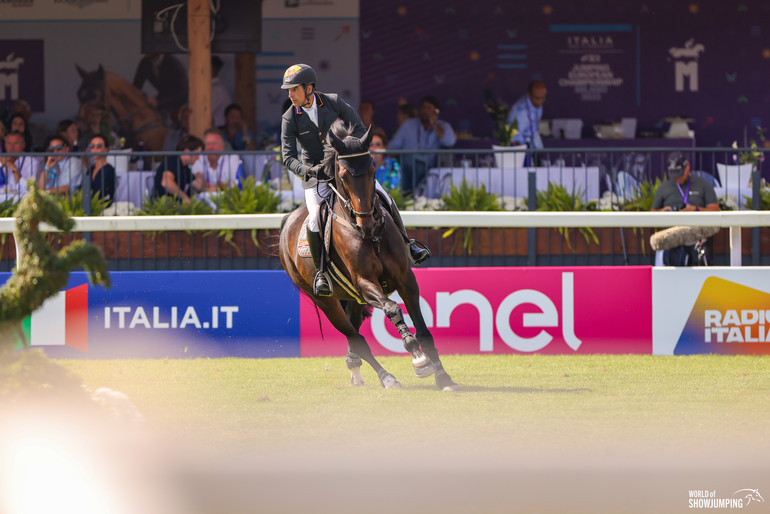Text © World of Showjumping
“Maybe I could have been smarter, maybe I could have put my foot down a bit more… But I’ve always done what I have known to be right in my heart,” Spain’s Manuel Fernandez Saro tells World of Showjumping. “For sure I have a lot left to achieve. I would like to win more than I have done, but I'm probably not the winner-type because I enjoy producing horses.”
With numerous different horses, the 49-year-old – affectionately known as Fanfa – has been an essential part of the Spanish jumping team for two decades. During his career, the Spanish rider has competed at six European Championships, three World Championships and at the Olympic Games in 2016 – with seven different horses.
MFS Horses
Fanfa is based in Sevenum, the Netherlands, and runs MFS Horses together with his partner Deborah. “It has been interesting to see so many totally different systems,” he reflects on his career prior to venturing out on his own.
When he was seventeen, Fanfa spent a year working with Piet Raijmakers at Zangersheide in Belgium. “It was a great experience. It was hard because I didn't speak any English or French, but I learned a lot,” he tells.
When you start on your own, everything is very hard
Returning to Spain, Fanfa then worked with his father Manuel – riding and producing horses that often came to him after others had failed with them. Paul Schockemöhle was among those who would send horses for Fanfa to ride, and as time went on, the German legend asked Fanfa to come and work for him in Germany. In 2002, Fanfa made the move from Spain to Mühlen, where he met his partner Deborah Jackson. After his time in Mühlen, Fanfa returned to Spain shortly, before spending a year at Jan Tops’ yard in Valkenswaard and then started on his own in 2009.
“When you start on your own, everything is very hard,” he points out. “However, on the other hand, it is nice to know that everything you do is for yourself. Together with my wife Deborah, we have managed to build a nice business that gives us a living. We have found good horses; I have been lucky to do some championships and jump some big classes.”
Focused on producing horses
What can be considered as success depends on what your business is based on, Fanfa points out. “When I have a horse that can do the big shows and be successful, the prize money naturally helps but that is not the foundation of our operation,” he explains. “I have always been riding horses that others didn't want to ride or couldn't ride. Most of those horses left when they were ready to be competitive; I could actually never keep them for too long. The first horse I did more than one championship with was U Watch, while Jarlin was the one I kept the longest. I rode him from he was seven until he was twelve, when he was sold. For the rest, I have only been able to keep the horses I have had during my career for a year or two. Looking at the riders winning big classes, they usually have a good, long relationship with their horses. I believe that there's no discussion about the fact that in order to be competitive and build a strong career, you need to have horses long-term.”
“I really like to produce horses, and that has always been my main focus,” he continues. “I am a very patient rider. Others might want to win, but I will never try to go fast if I don't feel that my horse is 100% ready for it. I am not saying that it is wrong to be competitive, but I’ve always been very cautious in this regard and I think it maybe shows in my career.”
I have always been riding horses that others didn't want to ride or couldn't ride
During his career, Fanfa has produced many horses that have gone on to be successful on the highest level. “I think I have jumped 26 different horses in Nations Cups and jumped nine championships with different horses,” he says.
However, some horses have left a lasting impression on Fanfa. “Cattani was a really special horse. I did my first championships with him in San Patrignano while I was working for Paul,” he tells. “The year before, he was jumping on 1.35m level, and he went on to win the final competition at the championship. Cattani was sold straight away and he did well with Norway’s Geir Gulliksen after. One of the best horses I have ridden however is Finn Lente who is now with Argentina’s Jose Maria Larocca. From he was seven, I could see that he would be very good. Cannavaro was also a fantastic horse, a bit special, but I had a great feeling with him. There have been so many nice horses, it is impossible to name them all. However, I think that the best one that I ever had is Ezilis du Mesnil that I have now. He is ten and I own him together with two of my best friends, so it's a nice story.”
With feeling
Not surprisingly, time is the most important ingredient when it comes to Fanfa’s approach to horses. “I try to give them time and do everything with feeling,” he explains. “I think having patience is the best way to work with horses and luckily maybe also my strongest point.”
“Riding a good horse is the biggest joy for me,” Fanfa continues. “Not in competition necessarily; I get the biggest pleasure from seeing horses develop the way I thought they would. Horses are incredible. They are powerful but extremely sensitive and to get the best out of them, you as a rider need to have feeling, be intelligent and patient. It's like a new challenge every day, trying to get to know them better. This is what fascinates me and keeps me motivated. Riding is the only thing I know, and I still feel the same curiosity towards horses as I did when I was a kid. When I get a new horse, I usually have a feeling instantly of what the potential is and what goals we could reach. And when my initial feeling becomes reality, that is the biggest reward there is.”
I get the biggest pleasure from seeing horses develop the way I thought they would
“These days, everything goes very fast; our lives are much more hectic than they used to be, and unfortunately this also reflects on the horses,” Fanfa continues. “There are so many shows now all over the world, and sadly you see how the careers of horses are getting shorter and in general there seems to be more injuries as well. I believe it is a natural outcome of the fact that the horses have to put in more effort, and they have less time to rest.”
“I also see problems that I didn’t see – or didn't realize – before, like stomach ulcers,” he points out. “When I was younger, I either didn't pay attention to this or I didn't feel it, but now this type of issues come up often. I believe it must be stress related, and I think we have to pay attention to the way our horses are fed and travel.”
Learning by watching
For the past few years, Fanfa has taken time to teach as well. “I find training others quite difficult,” he smiles. “I think the hardest part is trying to make my students understand the way I think. We work with a living being and it's not like a motorbike that you can tell someone to just get on and show them the buttons. The horse always comes first and you need to respect them, that is what it always starts from.”
You can learn a lot simply by watching
“I obviously prefer riding, but I do enjoy it if I can help others get better – even though I prefer to teach a horse. Teaching others helps with my own riding though, because you can see things that you don’t realise when you are riding yourself.”
“I also try to look at everyone around me, because you can learn a lot simply by watching. I am sure that everyone looks up to riders like Steve and Marcus, but I think you can learn from everyone. Obviously, I learned a lot from Paul in my time there and I have also worked closely with Henk Nooren.”
The politics of sport can be hard to understand
The Spanish Equestrian Federation has been affiliated with the FEI since 1924 – joining the FEI three years after the governing body of equestrian sports was first created by the eight founding member nations Belgium, Denmark, France, Italy, Japan, Norway, Sweden and the USA in 1921. In 2024, Spain organizes 258 international events – contributing heavily to equestrian sports. A return for their efforts is something Fanfa would wish for.
We have an amazing sport and we should make sure to showcase our uniqueness
“With the Spanish federation, we have achieved nice things in the past few years, but of course there is always room for improvement,” he says. “It is sad that a country like Spain, that gives a lot to the sport, does not really get much back. In my opinion, Spain has the best tours, as well as other lovely shows, and additionally hosts two World Cups and three Nation Cups – one of them the Longines League of Nations-final – welcoming everyone at all levels. Despite all this, we hardly get into any Nations Cups and it is difficult for our riders to get into the bigger shows. There are many countries that hardly contribute; countries that don’t organize any events, not to mention Nations Cups or World Cups. I wish we could see something in return for our contributions for the sport.”
“When it comes to rules and regulations, I think we would be much better off if we all went in the same direction, from riders to trainers and the equipment manufacturers,” Fanfa continues. “The politics of sports can be complicated to understand as we might not know exactly why certain decisions are made. We have an amazing sport – the only sport in the world that is done together with an animal and the only sport where men and women compete as equals – and we should make sure to showcase our uniqueness.”
The team around you matters
Throughout his career, Fanfa has only had four show grooms, and his current groom Malin Jonasson has been by his side for nearly 14 years. “I don't know if it is good or bad, but I don’t think there are many riders that can say the same nowadays,” he says.
Horses are such sensitive animals and they need to be taken care of by people who truly love them
"I think you need to be lucky with the people you meet, but on the other side you also have to treat them well. I was brought up with the mindset that unless you have good people around you, you are nobody. I believe it is true and especially important when it comes to the horses. Our time in the ring is very short, but there is so much going on behind the scenes. Horses are such sensitive animals and they need to be taken care of by people who truly love them. I think the team around you is just as important as your own riding skills.”
The times we live in
“I don’t think it’s the people, it's just the times we live in,” Fanfa says about the issues the equestrian industry is facing when it comes to finding good staff and providing them with good working conditions. “I think the current situation is not sustainable for many riders. When I was young, I was educated differently than the youth nowadays, at least that is the feeling I have. Now, it seems that everything is seen as ‘too hard’. The way I see it, is that when you want something in life, you have to fight for it. I am not saying that you need to suffer, but I believe that you need to have a certain level of determination.”
I think we should teach everyone to be horse people first and foremost
“I think we should teach everyone to be horse people first and foremost,” Fanfa concludes. “And when you learn to be a horse person, that's forever. I'm 49, so I have lived in between the old fashioned and the modern attitude; I have seen both sides. I believe I have been able to adjust as the times have changed, but I do think that some things were better before. There was maybe more work, but there was also more respect.”
“But we can’t turn back time; we are forced to adjust to the times we live in.”
19.6.2024 No reproduction of any of the content in this article will be accepted without a written permission, all rights reserved © World of Showjumping.com. If copyright violations occur, a penalty fee will apply.



